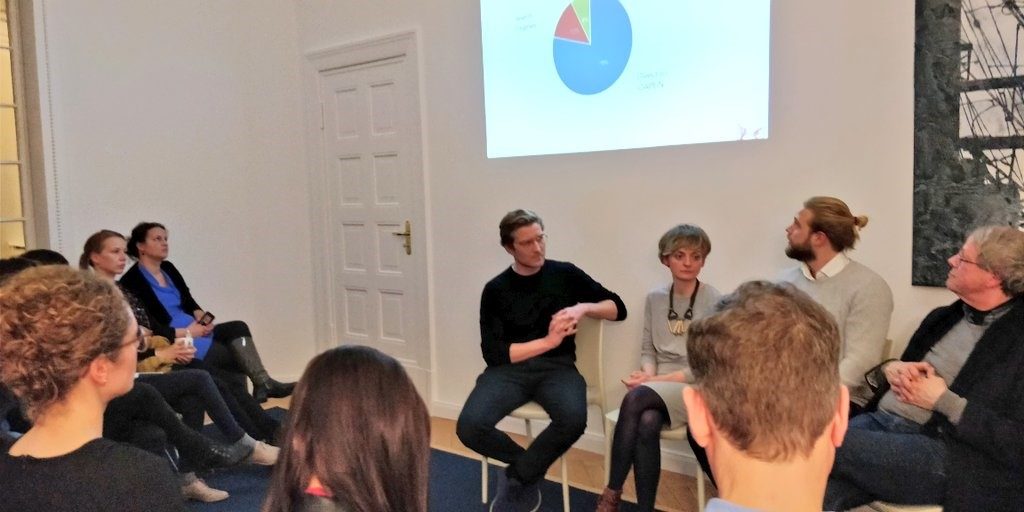
Panelists from the Berlin regional event included, left to right, Benedikt Fecher, Agata Morka, Max Mosterd, Prof. Dr. Michael Seadle. Photo credit: André Gaul
On March 9, 2018, members of the scholarly communications community in Berlin gathered for the first-ever Society for Scholarly Publishing (SSP) regional event on continental Europe to discuss ways to increase the discoverability of open access books. The speakers included Agata Morka, Senior Manager, OA books at Springer Nature; Max Mosterd, Head of Operations at Knowledge Unlatched, and Prof. Dr. Michael Seadle, Director of the Berlin School of Library and Information Science at Humboldt-Universität zu Berlin, and Benedikt Fecher, leading the research program “Knowledge Dimension” and “Internet-enabled innovations” at the Humboldt Institute of Internet and Society. Alexander Naydenov, Co-Founder of PaperHive, served as a moderator.
Looking for and, even more importantly, finding OA books proves to be a challenging endeavor. The panelists, representing key stakeholder groups, gave their answers to the questions of where the largest frictions in discovering OA books occur and how to make sure that OA books are living up to their full potential.
The panelists first identified the main approaches for discovering Open Access book content:
- searching in cross-discipline platforms (e.g. Google Scholar, Library Catalogues, Discovery Services, JSTOR, and OA-focused platforms OAPEN, HaithiTrust, DOAB); and,
- relying on discipline and community-specific platforms, usually publisher-maintained and integrated with publisher-websites (e.g. SpringerOpen, DeGruyter Open, Peter Lang OA, OUP, CUP, or Language Science Press).
These channels each face different challenges. The largest frictions resulting in low discoverability, frustrated researchers, wasted time, and lower author visibility are the effect of:
- Low-quality or missing Metadata,
- Erroneous MARC Records,
- Missing SEO optimization,
- Often bad usability of library portals and publisher,
- Libraries are not indexing MARC records for Open Access they did not financially support.
To overcome these and other frictions the panelists recommended:
- Higher investment in good metadata, ideally on a chapter level basis
- Agreeing on industry standards for books
- Enriching MARC records data with licensing information to clearly indicate Open Access eBook availability in library systems
- Promote the cataloging of Open Access eBook records by libraries, especially in case they didn’t financially contributed
- Work on clear information streams to the different stakeholders (including aggregators) so that books that switch to OA do not circulate as paid titles anymore
- Dive deeper into different scientific communities and react on their individual discovery needs and user behavior
The event, which was held at the new Berlin offices of Peter Lang International Academic Publishers and sponsored by Springer Nature and Knowledge Unlatched, welcomed attendees from publishing and technology companies (Wiley, PaperHive, Science Open, Klopotek, Dunker & Humblot, Dariah-EU) and the university library and research community (Free University, Technical University, Humboldt University, Leipzig University of Applied Sciences).
Organizers:
Agata Morka (Springer Nature)
Anne Kempen (Peter Lang International Academic Publishers)
Alex Naydenov (PaperHive)
Max Mosterd (Knowledge Unlatched)


Join the Conversation
You must be logged in to post a comment.